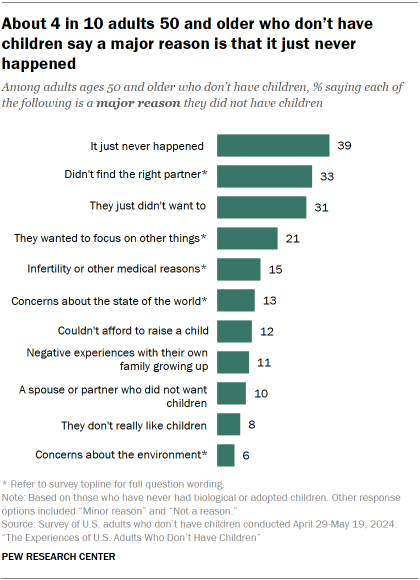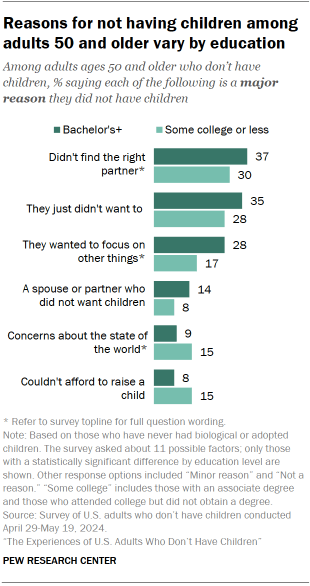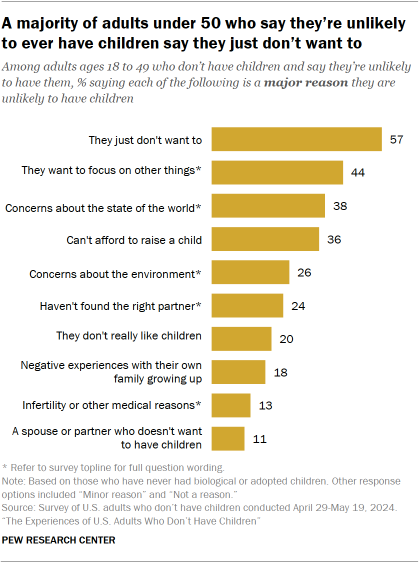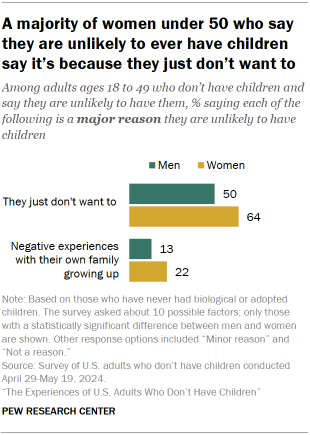Among U.S. adults who don’t have children, those ages 50 and older have mixed views on whether they ever wanted to have them in the first place. And their reasons for never having kids differ from those given by younger adults who say they’re unlikely to have them.
The top reason cited by those ages 50 and older is that it just never happened. Adults ages 18 to 49 are most likely to say they just don’t want to have children. These younger adults are also more likely than those in the older group to point to things like wanting to focus on other things, the state of the world or the environment, and financial concerns as major reasons they’re unlikely to have kids.
Views on wanting children
About four-in-ten adults ages 50 and older who never had children (38%) say there was a time when they wanted to have them. About a third (32%) say they never wanted to have children, while a quarter say they weren’t sure whether or not they wanted to do so.
There are no differences between men and women on this question.
But among women, those with at least a bachelor’s degree are more likely than those with less education to say they never wanted to have children (34% vs. 27%). There are no differences by education among men.
Reasons adults ages 50 and older didn’t have children
Adults ages 50 and older were asked to indicate how much each of 11 reasons factored into why they did not have children.

About four-in-ten (39%) say a major reason they didn’t have children is that it just never happened.
About a third say a major reason is that they didn’t find the right partner (33%) or that they just didn’t want to have children (31%).
About one-in-five or fewer point to different reasons, including wanting to focus on other things, like their job or other interests (21%), and infertility or other medical reasons affecting them or their spouse or partner (15%).
The reasons adults ages 50 and older give for not having children vary greatly by whether or not they ever wanted to have kids.
About half of those who wanted children at one point but never had any (51%) say it just never happened, compared with 20% of those who never wanted kids. They’re also more likely than those who never wanted children to say not finding the right partner (41% vs. 21%) and infertility (25% vs. 5%) are major reasons they never had children.
Unsurprisingly, a majority of those who say they never wanted to have kids (77%) say it’s because they just didn’t want to. About one-in-five or more say a major reason is that they wanted to focus on other things (37%), they don’t really like children (22%), concerns about the state of the world, other than the environment (20%), or negative experiences with their own family growing up (18%).
Differences by gender
For the most part, men and women ages 50 and older do not differ in the reasons they give for why they never had children. The differences that do exist are modest.
About four-in-ten men in this group (41%) say a major reason is that it just never happened, compared with 36% of women. Men are also more likely than women to point to concerns about the state of the world (15% vs. 10%) and not being able to afford to raise a child (14% vs. 9%).
And about one-in-five women (18%) say infertility is a major reason they didn’t have children, while 12% of men say the same.
Differences by education

Among adults ages 50 and older who don’t have children, those with a bachelor’s degree or more education are more likely than those with some college or less education to say each of the following is a major reason they didn’t have children:
- They didn’t find the right partner (37% of those with at least a bachelor’s degree vs. 30% of those with some college or less)
- They just didn’t want to (35% vs. 28%)
- They wanted to focus on other things (28% vs. 17%)
- A spouse or partner who didn’t want children (14% vs. 8%)
Those with a postgraduate degree are especially likely to say they wanted to focus on other things: 34% say this is a major reason they didn’t have children, compared with 24% of those with a bachelor’s degree only.
In turn, those with some college experience or less education are more likely than those with at least a bachelor’s degree to say concerns about the state of the world, other than the environment (15% vs. 9%), and not being able to afford to raise a child (15% vs. 8%) are major reasons they didn’t have children.
Reasons adults under 50 are unlikely to have children

When asked why they are unlikely to have children, the top answer for adults younger than 50 is that they just don’t want to. Over half of these adults (57%) say this is a major reason, much higher than the share of adults 50 and older who say the same (31%).
Similarly, by differences of 12 to 25 percentage points, those in the younger group are more likely than those ages 50 and older to say each of the following is a major reason they are unlikely to have children:
- They want to focus on other things (44% vs. 21% in the older group)
- Concerns about the state of the world (38% vs. 13%)
- They can’t afford to have a child (36% vs. 12%)
- They don’t really like children (20% vs. 8%)
And adults under 50 are about four times as likely as those ages 50 and older to say concerns about the environment, including climate change, are a major reason (26% vs. 6%).
Differences by gender

Among adults ages 18 to 49, women and men cite many of these factors at similar rates. But there are two items that women are more likely than men to point to as a major reason they are unlikely to have kids: they just don’t want to (64% vs. 50%) and negative experiences with their own family growing up (22% vs. 13%).
Differences by age
Adults ages 18 to 39 are particularly likely to cite certain reasons they are unlikely to have children, when compared with adults in their 40s:
- They want to focus on other things (51% of those 18 to 39 vs. 27% of those 40 to 49)
- Concerns about the state of the world, other than the environment (43% vs. 25%)
- They can’t afford to raise a child (41% vs. 22%)
- Concerns about the environment (30% vs. 14%)
The one reason adults ages 40 to 49 cite more than those under 40 is infertility or other medical reasons. About two-in-ten adults in their 40s who are unlikely to have children (22%) say a major reason is infertility, compared with 9% of those under 40.



